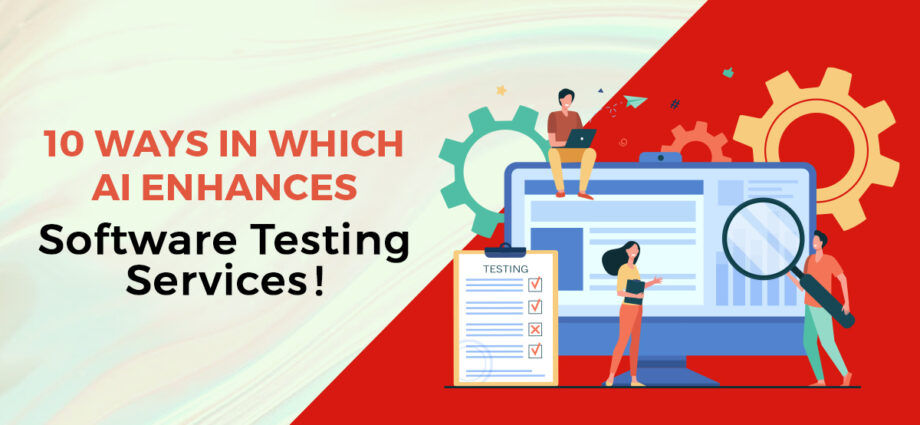Artificial Intelligence (AI) has transformed every domain! The transformation includes the software testing services industry as well. Global Market Insights reports the software testing market will grow by 7% CAGR between 2021 and 2027.
The role of artificial intelligence in expanding the market is distinct. There is a prediction that the software testing industry will be worth USD 60B by 2027.
AI-based testing uses intelligent algorithms to test software effectively. This will lead to a quick product delivery without compromising on quality.
Skim through this exciting piece to understand how AI boosts software testing.
-
Visual Validation
Using pattern recognition, AI and Machine Language(ML) can visually identify bugs. In addition, ML receives colossal amounts of information about vulnerabilities and other characteristics.
Having all the relevant information about bugs AI in software testing expedites vulnerability detection.
With AI in software testing, scrutiny of User Interface (UI) happens blazingly fast. This happens because of visual validation. It leads to saving crucial resources that can be invested elsewhere.
-
Improved Accuracy
Testing is done manually or automatically. Projects with a limited scope are tested manually.
AI-powered automation testing uses efficient algorithms to detect bugs in large projects. Identification of bugs and eliminating redundant tasks can be accomplished easily.
So, AI reduces the repetitive tasks of testers. In addition to this, it allows testers to focus on other aspects.
-
Better Test Coverage
The incorporation of AI in the testing process has expanded testing coverage. The AI-powered testing services overcome the limitations of the test scope in this way.
Having a better test coverage means multiple test cases can be executed in a single test run. Examining file content, data tables, etc., can be done in a jiffy. Therefore, this leads to broadening the test scope and reducing the time.
-
Saves Resources
According to Deloitte, AI can free up 30% workforce’s time which can be used for other tasks. The technology implementation doesn’t only save time but also eliminates redundancy.
The repetitiveness of certain operations can lead to the exhaustion of resources. With AI, SOP iteration is removed. This results in saving crucial time which can then be allocated elsewhere.
-
Faster Time To Market
With AI incorporation, redundancies disappear in an instant. Repeated tasks can be performed automatically as a result. So it leads to saving time to scrutinize the product.
Software Testing Life Cycle (STLC) constitutes procedure iteration at various stages. AI can identify those steps and expedite the procedure with its advanced algorithms. This revolutionary technology can expedite product deployment swiftly.
-
Reduces Defects
AI can identify defects at a desirable rate with the right analytics and data. The automation of the defect identification process has increased accuracy. Thus, leading to saving the overall testing time of the product.
AI in testing procedure ensures that service providers arm businesses with flawless products. So, this is an ideal situation for both the client and the service provider!
-
Better Defect Tracking
With large test data, the probability of having bugs increases exponentially. Therefore, with the implementation of AI, you can automate the testing procedures. It’ll lead to a faster bug identification process.
Not only do the bugs get identified quickly, the accuracy rate of doing so is also high. Therefore, AI implementation enhances the efficacy of the scrutiny mechanism. Thus, strong and efficient testing results in an impeccable product.
-
Consistency In Testing
Having AI is a blessing in disguise when it comes to examining software platforms. In addition, the ease with which bugs are identified is hard to describe! This is because the process removes redundancies.
Be it bug identification or faster deployment of a stable product; AI truly augments software testing. This is why the technology is highly consistent when scrutinizing a product.
-
Increased Adaptability
Traditional testing procedures take a single path. Therefore, a minor change can trigger test failure in automation tools. However, the implementation of AI in testing uses smart algorithms.
The algorithms in AI, while performing testing, ensure every testing path is accounted for irrespective of changes. The result is a robust and smoothly deployed product.
Also Read: The iCloud Bypass | The Best Bypassing Tool For All
-
Enhanced Regression Testing
With the faster module deployment, regression testing might get compromised. Hence, AI plays a key role in ensuring changes in code don’t adversely affect the product.
With AI implementation, the alterations in the code will not disrupt the software’s working process.
Wrapping Up!
In the end, AI has the ability to bring a revolutionary change in software testing services. Hence, removing redundancies in a jiffy can save crucial resources. Resources that can be put to use elsewhere judiciously.

